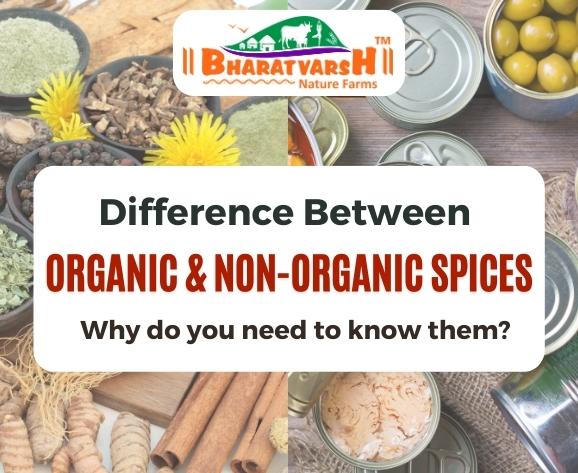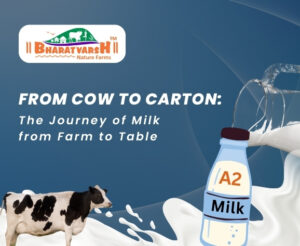Spices are an essential ingredient in many dishes, adding flavour and aroma that can make a meal truly delicious and memorable. However, not all spices are produced using the same methods. You need to know the difference between organic spices and non-organic spices as they can impact not only the taste and nutritional value but also on one’s health and environment.
Some spices are grown using traditional, natural farming methods, while others are prepared using synthetic fertilizers and pesticides. In this article, we’ll explore the difference between organic and non-organic spices, and why it’s important to be aware of them. Also, we’ll discuss the benefits of using organic spices and the potential risks of using non-organic spices.
What Are Organic Spices?
Organic spices are grown with the help of natural methods without synthetic fertilizers, pesticides, or genetically modified organisms (GMOs). Instead, they rely on chemical-free methods like compost, crop rotation, and other organic matter to improve soil quality and promote plant growth.
The benefits of using organic spices are numerous. Firstly, they are free from harmful chemicals that can affect both the environment and human health. Pesticides, for instance, can remain on spices long after they have been harvested and can cause severe harm to consumers.
They are produced in a way that makes them of higher quality, with a stronger flavour and aroma than the non-organic ones. Some examples of organic spices are basil, oregano, and thyme. These spices are common to be found in Mediterranean dishes. They pair well with meats, vegetables, and other ingredients and can also be used to add flavour to sauces, marinades, and dressings.
What Are Non-Organic Spices?
Non-organic spices, on the other hand, are grown using synthetic fertilizers and pesticides, which can negatively impact the environment and human health. Additionally, pesticides used in non-organic spices are considered harmful to both the farmers and the people who consume them.
Long-term exposure to pesticides is linked to numerous health problems, including cancer and developmental disorders.
Examples of non-organic spices include black pepper, cumin, and cinnamon. These are regularly used spices and can be found in a wide range of dishes, from savoury to sweet. Besides, they are commonly used in baked goods, such as pies and cakes.
How Organic Spices are Different from Non-Organic Spices?
As the name suggests, Spices in the ‘organic’ category are grown using methods that don’t include any kind of pesticide or chemical. They are without synthetic inputs. While ‘non-organic spices’ includes highly used synthetic fertilizers and pesticides.
Naturally-grown spices are often of standard quality, with a stronger flavour and aroma than chemically-grown ones. Non-organic spices are processed through two sterilization methods, i.e., fumigation and irradiation before they are sold in the market.
In fumigation, harmful chemicals like ethylene oxide are used to kill bacteria and other microbes which is extremely toxic for humans. Lastly, organic spices are produced with a lower carbon footprint and less waste, making them a more sustainable choice.
Why You Need to Know the Difference?
Undoubtedly, natural products are a far healthier option. Using chemical-free products can help reduce the risk of illnesses caused by harmful chemicals and pesticides. Spices that are considered ‘biotic’ can provide a richer and more authentic flavour to dishes.
Knowing the difference between them can help you make better and healthier choices. Unlike artificial ones, you can get most of the essential nutrients. Choosing them can help support sustainable farming practices, promote a healthy lifestyle, and reduce the impact on the environment.
How to Identify Organic and Non-Organic Spices?
It’s important to check the label to identify organic and non-organic spices. Look for the “certified organic” label on the packaging, which indicates that they were produced using natural farming practices and without synthetic inputs.
Additionally, you can look for “non-GMO” or “pesticide-free” labels to find high-quality organic spices. You should purchase from reputable sources, such as organic food stores or farmers’ markets.
Conclusion
We need to know the difference between organic and non-organic spices. By choosing organically grown, non-artificial spices, consumers can help reduce the risk of diseases caused by harmful chemicals and enjoy richer and more authentic flavours in their dishes.
Choosing organic spices is an effective way to support sustainable agriculture and promote healthier living. By being aware of the difference, we can make a positive impact on our health.
About Organic Farming at BharatVarsh Nature Farms
We are committed to caring for the environment, animals, and people at BharatVarsh Nature farms. We use organic or zero budget farming practices that improve the soil quality every year, provide good feed for our cows, and provide natural output for our customers. Our commitment is to supply the farmer’s produce that is always fresh, healthy, and tasty. Our farm also produces organic cereals such as Toor, Chana, Wheat, etc every season and they are available for sale at our farm. To know more about activities from BharatVarsh on organic farming, visit our website here www.bharatvarshnaturefarms.com
Contact Us:
Come visit us at our farm in Nagpur or Umred if you want organic food supplies or dairy products. We’re located at BharatVarsh Nature Farms, Post Virli Taluka, Umred, Dist. Nagpur-441204 (MH). Please contact us if you are interested in a daily subscription to deliver our organic food products to your home. Feel free to contact us at 8603214214 or info@bharatvarshnaturefarms.com with any questions.
Also Read: Nutrients & Health Benefits Of Organic Toor Dal – BharatVarsh Nature Farms




